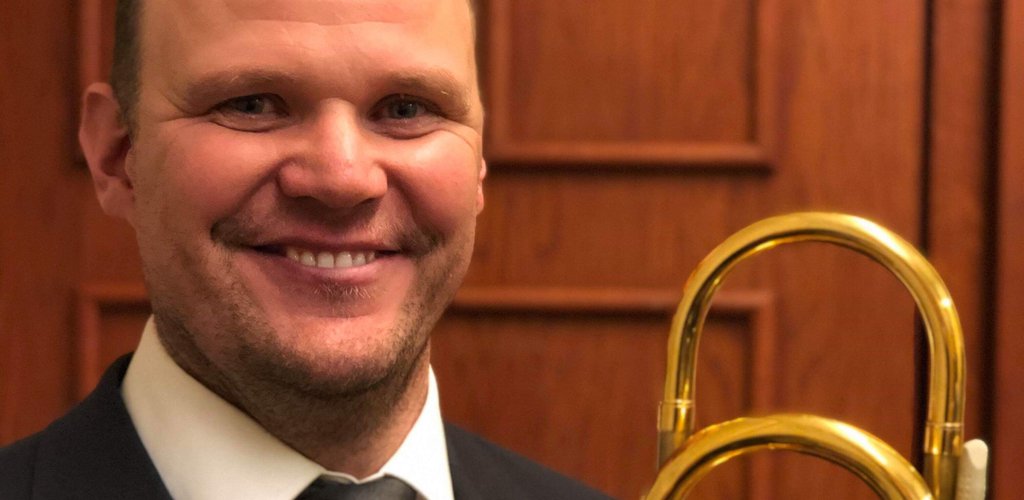Balázs Szakszon, leader of the Festival Orchestra’s trombone section, will treat the audience to a true rarity at our concerts on the 26th and 27th of January: a trombone concerto performed on an alto trombone, with no conductor. BFO musicians take the stage again as soloists.
You will perform as a soloist, without a conductor, at the Concertino series performances in January. This is a fairly unusual situation for a trombone player, isn’t it?
Balázs Szakszon: Indeed, the simple fact that we will be performing the piece without a conductor will make the concert special. It means we will have to play as chamber musicians, and I will have to perform as a soloist.
As far as I know, Albrechtsberger’s trombone concerto is a piece that is not played very often. Why is that?
B. Sz.: Yes, it is seldom performed and by few people. I last played it 17 years ago. Perhaps it’s because it is a difficult piece; it’s written in a fairly high register. This requires a particular kind of ability on the part of the musician to perform it. Furthermore, it wasn’t composed for the modern trombones of today, but for the smaller, Baroque-era alto trombone.
Can you tell us a little bit about this instrument?
B. Sz.: It is tuned differently than a tenor trombone. It’s also smaller than even today’s alto trombones; think of it like a small trumpet.
Will you be using a period Baroque instrument to perform the trombone concerto?
B. Sz.: No, this time I will be playing a modern alto trombone, but for other performances our Baroque ensemble often uses period Baroque instruments, authentic in terms of their sound and appearance. But this will not be the case at these concerts. To be honest, I have never heard the piece performed using a Baroque alto trombone.
Albrechtsberger was not a trombone player, but played the organ at a church in Klosterneuburg, and as I’ve read, he then became Emperor Joseph II’s court organist. So why did he compose a trombone concerto?
B. Sz.: Albrechtsberger was not just an organist, but a composer. He wrote the trombone concerto in B major in the late 18th century. At that time, no one was writing pieces like this one. Actually, as I understand it, Beethoven was a student of Albrechtsberger’s, and Albrechtsberger had ties to Hungary. For a while he was a choir leader in Győr before moving on to the orchestra of the Esterházy Palace. His works and his biography suggest that he was always trying to create something new. And because no one before him had ever thought to use the trombone as a solo instrument, he showed that it’s possible. He was a great innovator.
Before the trombone concerto in B major, Philippe Tondre will perform Mozart’s oboe concerto in C major as a soloist. The two instruments are very different, not to mention the two soloists. How much attention do you have to pay to what impact the Mozart oboe concerto has made before beginning your trombone piece?
B. Sz.: I think that because we will not be on stage at the same time, we don’t have to adapt our playing to one another. But the two pieces are actually not that far apart in terms of style. They were written in roughly the same period, and the environments of the two composers were not that different either. You can’t really compare the two instruments, of course, apart from the fact that they’re both winds. The trombone is much louder than the oboe, but the two instruments do just fine sharing an evening.
Iván Fischer’s idea to select the soloists of the Concertino series from among the winners of the Sándor Végh competition seems to be working out well. How do you see it?
B. Sz.: I think this is a great thing. It’s a tremendous opportunity for orchestra musicians. This is my 19th season as the trombone section leader of the Festival Orchestra, and I’m convinced that an orchestral performance requires entirely different preparation than a solo concert. Musicians have a great need to put themselves to the test and to show off another side of themselves. As far as the idea itself is concerned, the fact is that anything Iván Fischer sets out to do turns out well.
The next concerts in the Concertino series, already sold out, will take place on 26 and 27 January at the Italian Cultural Institute. We will broadcast the concert online on the 27th.
